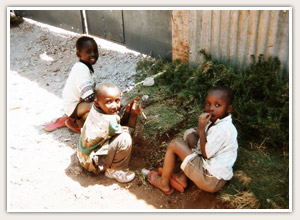Facts
At present, around 2.7 million people in Kenya suffer from a mental disability, this accounts for 15% of the entire population. A majority of these cases would benefit even from the smallest of contributions.
Although there has been great response to the needs of orphans, street children and slum-dwellers alike on the part of the government and the local and international aid organizations, the mentally disabled people, on the other hand, are largely forgotten and ignored on the whole. The mentally disabled are not only intentionally ignored by the society, they are also hidden, mistreated, disrespected and neglected.
Fearing to lose face in public, most organisations do not want to be associated with disabled people and very few organizations are willing to finance or support the already-existing initiatives by individuals.
The secondary effects for the affected and their relatives are enormous. Members of families, mostly mothers of the affected, would get banned and excluded from society along with their sick offspring. In many cases, the husbands would leave their wives so that most of the affected children would end up being brought up fatherless. Due to their disability in learning, the disabled children would be denied education, academically as well as socially. As a result, they would lack social and professional skills necessary to function in society; and hence being victims of a vicious cycle.
Only 0,5% of mentally disabled children receive any kind of education. Being banned, many children have no possibilities of interaction with other children which results in lacks of communicational skills, both linguistically and socially. They would also lack everyday skills necessary for performing the most basic of duties such as washing, cleaning and working in the fields.
A Kenyan institution has 700 000 families registered, having one or more cases of this disability. As there is no existing official network, the realistic figure is expected to be much higher. Furthermore, mentally handicapped people tend to be hidden and caged away; and it is only due to some concerned and caring teachers or mothers that at least some of the cases are being registered. In most of the cases parents are not able to manage their children, so the affected children are often given up and abandoned. |
|
 
|